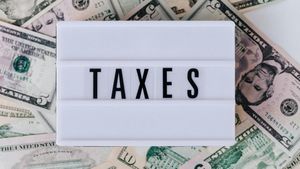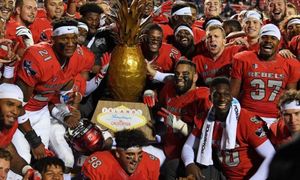President-elect Donald Trump has made headlines with his recent nomination of Representative Lori Chavez-DeRemer from Oregon as his choice for Secretary of Labor. While Trump is known for his controversial picks, this nomination stands out for its unexpected twist: many unions appear to back Chavez-DeRemer, which raises eyebrows among conservative critics. The appointment has sparked discussions around her alignment with conservative values and what it could mean for labor policies going forward.
Throughout her brief tenure in Congress, Chavez-DeRemer has been associated with various policy positions typical of the Republican Party, yet has also adopted viewpoints inconsistent with hardline conservative stances. For starters, during her term, she has been vocal about supporting labor rights, including initiatives to strengthen union organization efforts and policies advocating for amnesty for undocumented immigrants. This has drawn sharp criticism from some quarters of the GOP, eager to uphold what they see as traditional conservative principles.
Highlighting her roll as one of only three Republican sponsors of the radical union-supported PRO Act, critics have branded her as ‘toxic’ and not representative of conservative priorities. The PRO Act, which failed to pass last year, aimed to dismantle right-to-work laws and restrict independent contractor classifications, drawing criticism for being overly sympathetic to unions. Grover Norquist, the founder of Americans for Tax Reform, voiced his concerns, stating, “This is not mildly bad. This is huge and she voted for it.”
Perhaps the most contentious aspect of this nomination is the timing and nature of the support Chavez-DeRemer has garnered. She lost her election bid but has since been named labor secretary, illustrating the precarious balance Trump seeks to maintain between union allegiances and conservative ideals. Ken Girardin, from the Empire Center for Public Policy, expressed concern about the signal this nomination sends: “The signaling effect alone from this nomination would be...that the Trump administration is not serious about deregulation or economic growth.”
There are indications of relationships forming between Trump and union leadership, evident from reports of Teamsters President Sean O’Brien advocating for Chavez-DeRemer's nomination. According to sources, O’Brien thanked Trump on the day of the announcement for prioritizing worker interests, asserting, “You put words to action.” The unusual union support might reflect Trump's strategy to consolidate labor ranks to bolster his political base, especially as he gears up for the 2024 campaign.
Despite the high-profile support from unions, internal Republican factions remain skeptical about Chavez-DeRemer's effectiveness as Secretary of Labor. A source close to Trump noted, “Business won’t like her. This was not a great appointment.” Cautioning against her perceived failure to represent traditional Republican interests are numerous conservative commentators who warn of the potential shift this move could indicate, particularly with regards to labor policies.
While some argue the endorsement of Chavez-DeRemer from certain unions may signal progress for bipartisanship efforts, the reality remains complex. Union leaders have expressed hope she would prioritize worker conditions and openings for unions, contrasting with the expectations of the right-leaning faction of the party dismayed by their alignment with the new secretary precedent. Questions abound whether Chavez-DeRemer can navigate the political minefield these conflicting expectations create—instead of being branded as either too pro- or anti-labor.
Chavez-DeRemer, if confirmed, will preside over the Department of Labor just as the nation is tackling numerous economic hurdles, including post-pandemic recovery efforts, adjusting wage standards, and possibly facing challenges against existing labor laws. Critics are already wondering how her decisions might tip the balance of labor rights during such politically fraught times, especially as union involvement increases significantly.
What adds to the intrigue is the public’s perception of her nomination. Polls suggest mixed feelings among voters. While some view the nomination as invigorated support for labor, others fear it signals the impending government under Trump will drift from the core principles espoused during his last term, particularly around deregulation policies aimed to stimulate economic growth. Labor unions have provided considerable backing to Trump during his previous campaign, and he may be aiming to alleviate past tensions created amid varied policies directed against organized labor.
The Senate confirmation process looms large as an inevitable step. Whether Republican senators will be swayed by inter-party pressure or stand firm against what many see as Chavez-DeRemer’s departure from conservativism remains uncertain. It’s unclear whether they will rally around the chance to embrace labor-friendly candidates or rebel against it at the expense of their party line.
For many watching, Chavez-DeRemer's appointment encapsulates the broader philosophical struggle within the Republican Party as it redefines itself following the chaotic nature of Trump’s first term and prepares for the immediate future. Her nomination could very well be the litmus test for the party's direction: will it lean toward pro-labor sentiments as Trump appears poised to, or will it remain loyal to the principles of deregulation and limited government intervention?
Only time will reveal the true impact of this decision as both unions and the electorate observe how Chavez-DeRemer adapts to her role. Will she initiate significant changes concerning labor laws, or will her nomination become just another footnote within the annals of Trump’s ambitious agenda? The answer to this question could shape not just the present administration’s policies, but also the political future for Democrats and Republicans alike as they prepare for the election battle of 2024.
Understanding the growing rift within the Republican party and how Chavez-DeRemer’s association with unions might affect the upcoming elections calls for attentive scrutiny. It raises pressing questions about how ideological alignments may shift and whether Trump will succeed in balancing these diverse interests. While the Democrats might seek to capitalize on any internal discord, only time will tell if Republicans, led by Chavez-DeRemer, can either unify or splinter under the weight of competing labor interests.



